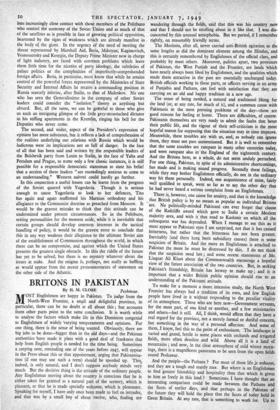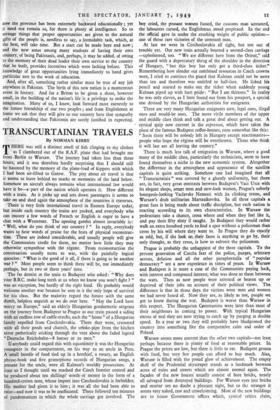BRITONS IN PAKISTAN
MOST Englishmen are happy in Pakistan. To judge from the North-West Frontier, a small and delightful province, in particular, there can be no doubt at all about this ; but accounts from other parts point to the same conclusion. It is worth while to analyse the factors which make life in this Dominion congenial to Englishmen of widely 'varying temperaments and opinions. For one thing, there is the sense of being wanted. Obviously, there are big jobs to be done—bigger than in the old days—and the Pakistan authorities Shave made it plain with a good deal of frankness that help from English people is needed for the time being. Sometimes a carping note, reminding one of the years before 1947, will appear in the Press about this or that appointment, urging that Pakistanisa- tion (if one may use such a term) should be speeded up. This) indeed, is only natural, and I don't suppose anybody minds very much. But the decisive thing is the attitude of the ordinary people. Any Englishman moving about the country is conscious that he is either taken for granted as a natural part of the scenery, which is pleasant, or that he is made specially welcome, which is pleasanter. Speaking for myself, I have only once been made to feel an intruder, and that was by a small boy of about twelve, who, finding me
wandering through the fields, said that this was his country now and that I should not be strolling about in it like that. I was dis- concerted by this unusual xenophobia. But we parted, if I remember rightly, on reasonably friendly terms.
The Moslems, after all, never carried anti-British agitation to the same lengths as did the dominant element among the Hindus, and this is certainly remembered by Englishmen of the official class, and probably by most others. Moreover, politics apart, two provinces of Pakistan, the West Punjab and the Frontier, are lands which have nearly always been liked by Englishmen, and the qualities which made them attractive in the past are essentially unchanged today. British officials working in these parts, or officers serving in an army of Punjabis and Pathans, can feel with satisfaction that they are carrying on an old and happy tradition in a new age.
The sense of being needed, a natural and traditional liking for the land (or, at any rate, for much of it), and a common cause with Pakistanis in the most pressing problems of the day—these are good reasons for feeling at home. There are difficulties, of course. Pakistanis themselves are very ready to admit the faults that beset their public life, and the vigour of their self-criticism is the most hopeful reason for supposing that the situation may in time improve. Meanwhile, these troubles are with us, and, as nobody can ignore them, they must not pass unmentioned. But it is well to remember that the same troubles are rampant in many other countries today, and were rampant also in the England of the eighteenth century. And the Britons here, as a whole, do not seem unduly perturbed. For one thing, Pakistan, in spite of its administrative shortcomings, has made and is making sound progress. Secondly these failings, while they may bother Englishmen officially, do not in the ordinary way hit them personally. Indeed, one acquaintance of mine, fairly well qualified to speak, went so far as to say the other day that he had never heard a serious complaint from an Englishman.
There is, however, one cause for anxiety, and that is the knowledge that British policy is by no means as popular as individual Britons are. No politically-minded Pakistani can ever forget that clause of the Radcliffe award which gave to India a certain Moslem majority area, and with it that road to Kashmir on which all the subsequent war has depended. When I manage to see this as it must appear to Pakistani eyes I am surprised, not that it has caused bitterness, but rather that the bitterness has not been greater. Inevitably (and there have been subsidiary causes) there is some suspicion of Britain. And the more an Englishman is attached to Pakistan the more he must be distressed by this. I do not think that the suspicion need last ; and some recent statements of Mr. Liaquat Ali Khan about the Commonwealth encourage a hopeful view of the future association of the two countries. But, in seeking Pakistan's friendship, Britain has leeway to make up ; and it is important that a wider British public opinion should rise to an understanding of the Pakistani attitude.
To make for a moment a more intensive study, the North West Frontier has always had a tradition of its own, and few English people have lived in it without responding to the peculiar vitality of its atmosphere. Those who are here now—Government servants, for the most part, of one kind or-another, and a few missionaries and others—feel it still. All, I think, would affirm that they have a real regard for the province, not a merely formal or dutiful concern, but something in the way of a personal affection. And some of them,.I know, feel this to the point of enthusiasm. The landscape is varied and grand, fertile in some places with orchards and irrigated fields, more often desolate and wild. Above all it is a land of mountains ; and now, in the clear atmosphere of cold winter morn- ings, there is'a magnificent panorama to be seen from the open fields round Peshawar.
And the people—the Pathans ? For most of them life js arduous, and they are a tough and sturdy race. But where is an Englishman to find greater friendship and hospitality than that which is given to him so freely in this land ? Sometimes I have thought that an interesting comparison could be made between the Pathans and the Scots of earlier days, and that perhaps in the Pakistan of the future they will hold the place that the Scots of today hold in Great Britain. At any rate, that is something to work for. Up to now the province has been extremely backward educationally ; yet it need not remain so, for there is plenty of intelligence. So to arrange things that proper opportunities are given to the natural gifts of the people is, needless to say, a formidable task, which, at the best, will take time. But a start can be made here and now ; and the new sense among many students of having their own country, of being Pakistanis, and, perhaps, it may be added, of owing to the memory of their dead leader their own service to the country that he built, provides incentives which were lacking before. This knowledge of great opportunities lying immediately to hand gives particular zest to the work of education.
And, after all, something rather similar must be true of any job anywhere in Pakistan. The birth of this new nation is a momentous event in history. And for a Briton to be given a share, however small, in the building of the nation's life is a privilege to strike the imagination. Many of us, I know, look forward most earnestly to the future friendship of our two peoples ; and from Englishmen at home we ask that they will give to our country here that sympathy and understanding that Pakistanis are surely justified in expecting.







































 Previous page
Previous page